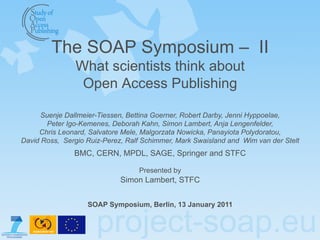
Soap symposium-talk-ii
- 1. The SOAP Symposium – II What scientists think about Open Access Publishing Suenje Dallmeier-Tiessen, Bettina Goerner, Robert Darby, Jenni Hyppoelae, Peter Igo-Kemenes, Deborah Kahn, Simon Lambert, Anja Lengenfelder, Chris Leonard, Salvatore Mele, Malgorzata Nowicka, Panayiota Polydoratou, David Ross, Sergio Ruiz-Perez, Ralf Schimmer, Mark Swaisland and Wim van der Stelt BMC, CERN, MPDL, SAGE, Springer and STFC Presented by Simon Lambert, STFC SOAP Symposium, Berlin, 13 January 2011 project-soap.eu
- 2. Motivation • An opportunity to conduct a comprehensive survey of scientists with respect to Open Access journal publishing – All academic disciplines, not only “hard” sciences • Attitudes • Beliefs • Practices – The next session: how scientists really behave with respect to OA publishing Simon Lambert | STFC SOAP Symposium 2
- 3. Design of the survey • Online survey with 23 questions • Characteristics of the respondents themselves (“demographics”), then attitudes, beliefs and practices • Multiple choice • Two questions also with optional free text boxes for amplification of answers Simon Lambert | STFC SOAP Symposium 3
- 4. Example questions Simon Lambert | STFC SOAP Symposium 4
- 5. Distribution of the survey Simon Lambert | STFC SOAP Symposium 5
- 6. Response to the survey • 53,890 responses by 10 August 2010 – Snapshot for analysis on this date • 85.7% active researchers • 162 countries • The “golden subset”: – Researchers – At least one article published in last five years – Answered question whether OA beneficial to their field Simon Lambert | STFC SOAP Symposium 6
- 7. Response to the survey 38,358 Simon Lambert | STFC SOAP Symposium 7
- 8. The key attitudes (1) • Q9: Do you think your research field benefits, or would benefit from journals that publish Open Access articles? – Yes / No / I have no opinion / I do not care Simon Lambert | STFC SOAP Symposium 8
- 9. Is OA seen as beneficial? Simon Lambert | STFC SOAP Symposium 9
- 10. Is OA seen as beneficial? Simon Lambert | STFC SOAP Symposium 10
- 11. Is OA seen as beneficial? Simon Lambert | STFC SOAP Symposium 11
- 12. Is OA seen as beneficial? Simon Lambert | STFC SOAP Symposium 12
- 13. Is OA seen as beneficial? Simon Lambert | STFC SOAP Symposium 13
- 14. Is OA seen as beneficial? The same with error bars Simon Lambert | STFC SOAP Symposium 14
- 15. Free text answers: why (not) beneficial • All free text answers were read and tagged by the essence of their content • 17,852 respondents! Negative tags (1,825 tags): Green OA enough Positive tags (22,312 tags): Fairness/vanity press Accessibility Low quality Financial issues No or bad peer review Individual benefit Not needed Scientific community benefit Presence or amount of fees Public good Profit-driven Other Unsustainable Other Simon Lambert | STFC SOAP Symposium 15
- 16. Why is OA beneficial? 16,734 respondents Simon Lambert | STFC SOAP Symposium 16
- 17. Why is OA beneficial? Simon Lambert | STFC SOAP Symposium 17
- 18. Why is OA not beneficial? 1,118 respondents Simon Lambert | STFC SOAP Symposium 18
- 19. The key attitudes (2) • Q23: Listed below are a series of statements, both positive and negative, concerning Open Access publishing. Please indicate how strongly you agree/disagree with each statement. – Researchers should retain the rights to their published work and allow it to be used by others – Open Access publishing undermines the system of peer review – Open Access publishing leads to an increase in the publication of poor quality research – If authors pay publication fees to make their articles Open Access, there will be less money available for research – It is not beneficial for the general public to have access to published scientific and medical articles Simon Lambert | STFC SOAP Symposium 19
- 20. The key attitudes (2) • Q23: Listed below are a series of statements, both positive and negative, concerning Open Access publishing. Please indicate how strongly you agree/disagree with each statement. – Open Access unfairly penalises research-intensive institutions with large publication output by making them pay high costs for publication – Publicly-funded research should be made available to be read and used without access barrier – Open Access publishing is more cost-effective than subscription- based publishing and so will benefit public investment in research – Articles that are available by Open Access are likely to be read and cited more often than those not Open Access Simon Lambert | STFC SOAP Symposium 20
- 21. What is believed about OA publishing? Simon Lambert | STFC SOAP Symposium 21
- 22. What is believed about OA publishing? • Degrees of agreement can be expressed on ordinal scale … • … which enables identification of groups (clusters) of respondents with similar beliefs. Simon Lambert | STFC SOAP Symposium 22
- 23. What is believed about OA publishing? Simon Lambert | STFC SOAP Symposium 23
- 24. Clustering of beliefs: the OA-positive cluster Simon Lambert | STFC SOAP Symposium 24
- 25. Clustering of beliefs: the OA-sceptical cluster Simon Lambert | STFC SOAP Symposium 25
- 26. Clustering of beliefs: the OA-positive cluster Simon Lambert | STFC SOAP Symposium 26
- 27. Clustering of beliefs: the OA-sceptical cluster Simon Lambert | STFC SOAP Symposium 27
- 28. Conclusions • The SOAP survey is considerably more comprehensive than any comparable survey. • It sheds light on subject areas and countries that have hitherto received little attention. • The data will be made public … the questions are waiting to answered! Simon Lambert | STFC SOAP Symposium 28
- 29. Thank you! Project team: info@project-soap.eu Presenter: simon.lambert@stfc.ac.uk Project co-ordinator: Salvatore.Mele@cern.ch Website: http://soap-fp7.eu project-soap.eu
